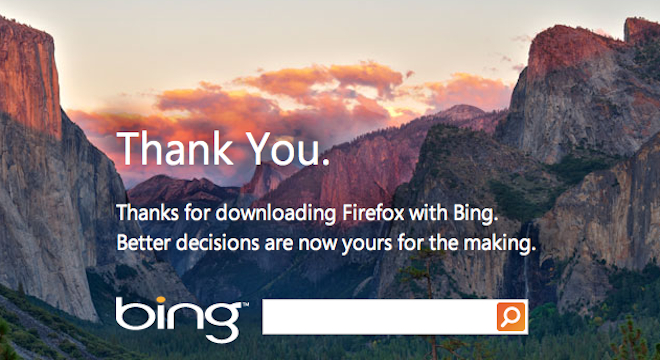Of all the competitions going on right now between tech firms (over who has the best social network, who has the best mobile phone OS, etc), the browser wars might have just become the most surreal.
On Wednesday, Microsoft, the company that faced numerous antitrust allegations over bundling its Internet Explorer browser for free with its Windows operating system in the 1990s, announced it was teaming up with Mozilla, the company behind the Firefox browser, which rose out of the ashes of the Netscape browser, which Internet Explorer helped kill off.
That’s right, users can now download an all-new “Firefox with Bing,” actually just Firefox version 7.01 with Bing as the built-in search bar in the corner, the default homepage and as the search technology behind the “AwesomeBar,” aka the URL bar at the top of the browser, into which users can enter letters and keywords and allow Bing to suggest websites based on previous browser history.
“We are excited to make it even easier for members of the Mozilla Firefox community to use Bing. Please let us know what you think,” wrote Tor Steiner, manager of strategic partnerships at Microsoft, in a post on the Bing blog.
Of course, as Steiner noted in his post, the move is simply the natural culmination of an increasing collaboration between the two companies on built-in browser Bing search functionality that began a year ago. Back in October 2010, the companies announced that Bing would appear as one of the options in the upper-right hand corner search bar in the Firefox browser.
And actually, the collaboration can be dated even further back, to August 2005, when a Microsoft executive extended an olive branch to the Mozilla team in the form of an invitation for the two companies to collaborate on ensuring maximum Firefox interoperability with then-forthcoming Windows Vista. Unofficially, Mozilla’s lead developer has also expressed his uneasiness with Google’s values, specifically with regards to user privacy, and advocated that Firefox Web users switch to searching on Bing instead of Google.
But the burgeoning friendship has also come as Mozilla’s relationship with Google has frayed, and may now be on the verge of being terminated. As ZDNet‘s Steven J. Vaughan-Nichols wrote:
For many years, Mozilla’s chief source of revenue has been Google. Every time you would use the Web browser’s built-in search window, Mozilla would get a tiny payment. It wasn’t much, but hundreds of millions of searches a week add up. That Firefox search box is believed to account for anywhere from 85 percent to 90 percent of Mozilla revenue.
It hasn’t been adding up to much lately. While Mozilla’s total revenue and support for 2010 was up to $123.2 million, the net income year was down by almost 20%.
Meanwhile, Google has seen use of its own browser, Chrome, explode in the past year from 11.54 percent of the global market in September 2010 to 23.61 percent in September 2011, eating away at both the market share of Firefox (which declined slightly from 31.5 percent to to 26.79 percent) and Internet Explorer (but more so Firefox, which it is on track to overtake). And Internet Explorer has continued its inexorable decline, though it still commands the largest share of the browser market, 41.66 percent, according to StatCounter.
All eyes are on the month of November, 2011, when Mozilla’s contract with Google is up for renewal. As ComputerWorld reported, Mozilla said earlier this month: “We have every confidence that search partnerships will remain a solid generator of revenue for Mozilla for the foreseeable future,” but did not actually address the potential for losing its contract with Google, which many tech pundits take as an inevitability. In that context, and in the context that both Microsoft and Mozilla are struggling to retain market share from the onslaught of Chrome, Wednesday’s deal makes sense.
It makes sense from another perspective, too: The search engine wars. Google is still killing it in search engine market share globally and in the U.S., despite the fact that Yahoo outsourced all of its search technology to Microsoft’s Bing in 2009.
Over the past year, Bing’s global search market share has remained essentially flat at just over 3.40 percent, compared to Google’s basically flat 90 percent market share, according to StatCounter, while in the U.S., the competition is slightly hotter, with Google at just 79.31 percent compared to 82.35 percent a year ago as Bing rose from 7 to 9 percent.
And that reality, that the enemy of my enemy is my friend, could explain the genteel message from Bing after a user downloads the new Firefox with Bing. “Thank You. Thanks for downloading Firefox with Bing. Better decisions are now yours for the making.”









